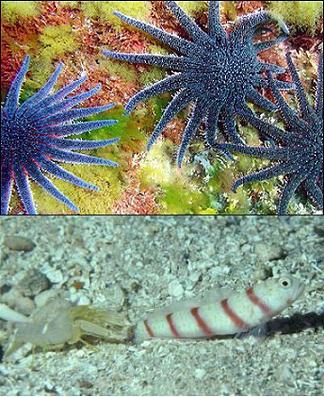This year alone, 178 new sea fish were discovered. It is estimated that there are at least 5,000 fish hidden in the depths of the oceans that are unknown to us. Their investigation will lead to the ancient evolution from 3.5 billion years ago
John Hilfrin, New York Times, Haaretz

Meet - new starfish and the red-striped goby fish (photos: Marine Life Forms Registry Project)
Direct link to this page: https://www.hayadan.org.il/newfish1104.html
In the depths of the Pacific Ocean, near the island of Guam, the researchers met a red-striped goby fish. They did not know him, and were surprised to find out that he maintains a special partnership with Hasilon, who hangs on his tail. The goby guards, the goby digs and swims - and then they both hide in it together. In the same habitat, the marine biologists also discovered a gold-speckled fish. Another surprise awaited scientists in the Prince William Strait in Alaska. They found there red algae (Rhodoliths) - red algae, coral-like, stiff, whose shape resembles a star and grows like weeds in colonies of shrimps and shells.
These are just some of the hundreds of new species of fish, other animals and plants that have been discovered in the oceans in the past year. Following the discoveries, which were published yesterday, the number of known life forms in the oceans rose to about 230 thousand. "In general, it can be said that the smaller the life forms in the ocean, the less we know about them," said yesterday Frederick Gerzel, chairman of the scientific steering committee of the Marine Life Forms Registry project and head of the Institute of Marine and Coastal Sciences at Rutgers University in the USA.
The participants in the project, which started about four years ago and should last a total of ten years, claim that there is no slowing down in the rate of discovery of the species. Even in Europe and other areas that were thoroughly studied in the past, more and more new species are being discovered. Along with the increase in the number of species, the project also recorded an increase in the number of researchers: last year it included 300 scientists from 53 countries, today about a thousand scientists from 70 countries participate in it.
The project was launched in May 2000; This is the second year in a row that the scientists report significant discoveries, and they anticipate more discoveries down the road. The registration of microbes - the smallest organisms that exist - is only beginning now. According to the researchers, when this part of the project is completed, they will discover that the oceans, which occupy about 70% of the earth's surface, are a breeding ground for about 20 thousand species of fish and almost two million species of animals and plants, many of which are basic and small life forms, such as worms or jellyfish.
Investigating the genetic codes of these species "will lead us to ancient history and the ancient evolution of life in the oceans, to a period much earlier than the fossil finds from three and a half billion years ago," said Gressel.
The number of new marine fish discovered this year is 178, which increased the number of species of these fish from 15,304 to 15,482. The number of other animals and plants discovered this year is difficult for scientists to estimate at this stage, although it is clear that it is several hundred higher than the number of species discovered the previous year. The difficulty in registration stems from the fact that scientists from all over the world participate in the project, sharing information among them, and sometimes "duplications are discovered in the registration of the new and existing species", according to Ronald Odor, a marine biologist from Dalhousie University in Canada and the project's chief scientist. "Until you put all the information together, you don't find out that two people in two different countries gave different names to the same species."
The idea for the species registry arose as a result of scientists' concern that the increase in the human population could cause irreversible changes in the diverse life forms in the oceans, as the National Academy of Sciences warned in 1995. So far, about 125 million dollars have been invested in the species registry project, with its final cost expected to reach a billion dollars - most of it from the funds of the participating countries.
They know evolution in action
For news on the subject at the BBC
https://www.hayadan.org.il/BuildaGate4/general2/data_card.php?Cat=~~~13227577~~~198&SiteName=hayadan
